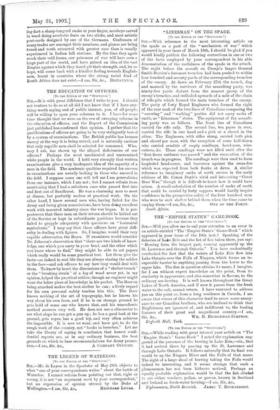THE EDUCATION OF OFFICERS.
[To THE EDITOR OF THE " SPECTATOR." j SIB,-4t is with great diffidence that I write to you. I should not venture to do so at all did I not know that if I have any- thing worth saying and of public interest, you, of all people, will be willing to open your columns to it. I have for• some time thought that we were on the eve of sweeping reforms in the education of officers, and the Report of the Commission just published has confirmed that opinion. I gather that the qualifications of officers are going to be very stringently tested by a system of examinations. The British public has become uneasy at the way it is being served, and is naturally anxious that only capable men shall be selected for command. Who, may I ask, has shown up the alleged deficiencies of our officers ? Perhaps the most uneducated and unexamined white people in the world. I hold very strongly that written examinations give a very inadequate idea of the capacity of a man in the field. The academic qualities required for success in examinations are usually lacking in those who succeed in the field. I suppose some one will tell me I am generalising from one instance, which I am not ; but I cannot refrain from mentioning that I had a subaltern once who passed first into and first out of Sandhurst. He was a charming man to meet at dinner, but perfectly useless at practical work. On the other hand, 1 know several men who, having failed for the Army and being given commissions, have been doing excellent work with mounted infantry since the war began. It is pre- posterous that these men on their return should be kicked out of the Service or kept in subordinate positions because they failed to grapple adequately with questions on " horizontal equivalents." I may say that these officers have great diffi- culty in dealing with figures. So, I imagine, would their very capable adversaries, the Boers. If examiners would consider Dr. Johnson's observation that " there are two kinds of know- ledge, one which you carry in your head, and the other which you know where to find," they might be able to set papers which really would be some practical test. Let them give the facts—as indeed in real life they are always staring the soldier in the face—and ask officers to say how they would deal with them. To know by heart the dimensions of a " shelter trench" or the " breaking strain" of a log of wood never yet, in my opinion, helped the practical soldier, though an engineer might want the latter piece of knowledge in his pocket. The Boer on being attacked makes the best shelter he can ; a lively regard for his own personal safety teaches him this. The Boer knows nothing of the art of topography, but he knows his way about his own farm, and if he is on strange ground he gets hold of some one who knows that, and his unacademic method answers very well. He does not use a clinometer to see what slope he can get a gun up ; he has a good look at the ground, gets ropes, has a good try, and very often achieves the impossible. It is men we want, and have got, to do the rough work of the country, not "books in breeches." Let me take the liberty of saying in conclusion that honest confi- dential reports are, as in any ordinary business, the best grounds on which to base recommendations for Army promo-










































 Previous page
Previous page